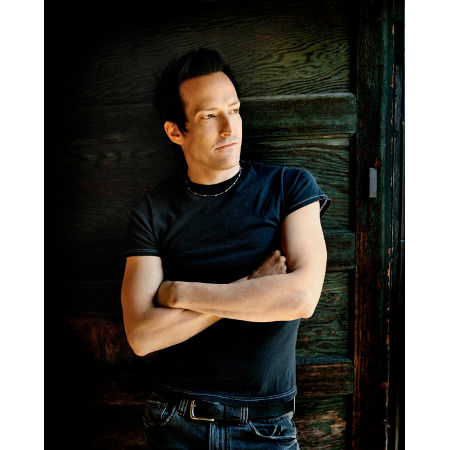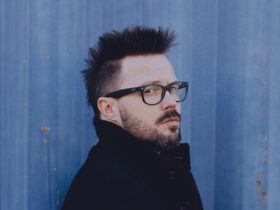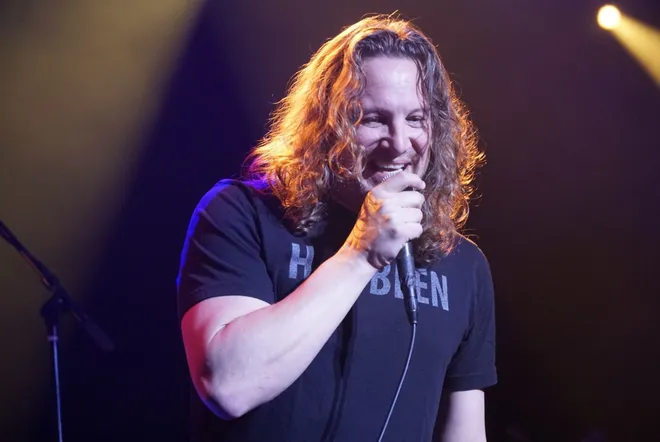Richard Patrick is the frontman for the band Filter, and one of the co-founders of the supergroup Army of Anyone. Richard took the time to talk about Filter’s latest album ‘Trouble With Angels’ and give us a sneak peak at his future plans. Richard is not only a talented musician, but an all around awesome guy to talk with! I hope you enjoy reading this as much as I enjoyed talking to Richard!
TJ: I Just reviewed “The Trouble with Angels’ and it is a great album. This is Filter’s fifth album, so what was this most recent recording experience like?
Richard: Bob Marlette’s involvement in this thing was great. He has worked with some heavy hitters like (Black) Sabbath. He understands heavy, he knew we had to bring that “Short Bus” vibe back into it. He’s also a great all around songwriter and because he is a great songwriter, it helped finish tracks way faster. I guess around the early part of the 2000s, I just wasn’t completing songs fast enough. I wasn’t getting to the ideas that I wanted to. I guess that’s why I did Army of Anyone. Then when I was in Army of Anyone, I just really realized how much I missed Filter. So when I went back and did “Anthems,” which was a special album because it was geared towards the friends and family of a friend of ours who was killed in Iraq; it was a myopic record, a protest record against the Iraq War and support for the troops record.
TJ: And that all leads up to working with Bob Marlette…
Ricard: The funny thing is that I met Bob right after I got out of rehab and we talked about possibly working together, but I didn’t feel like I needed help writing. Then I went into this bizarre odyssey of Army of Anyone and that was a journey away from Filter, so when I came back to Filter, I realized that I did want to write songs with someone and so I called Bob up. Actually, John 5 wrote “Drowning” with me and Bob, so he reintroduced me to Bob and the next thing you know we are talking about doing a record. Then Bob says “let’s just do it, let’s do a record,” and I asked him what we were going to do for a label and he just said “let’s worry about that when we’re done.” It was amazing! He was a huge champion for this record. You know, our first meeting he said to me “Rich, I know you’re sober. I know you’re growing up and you got kids. You’re a man, you got a mortgage and you’re a responsible adult now, but what happened to the kid who wrote ‘Hey Man, Nice Shot?’ What happened to the kid who would go off on these adventures, get in trouble, get arrested, where is that kid?” I told him that is still me. I have those experiences and he said “Well that’s what I want you to talk about.” So “Drug Boy” was the first song we worked on together and I had to dive back into my craziness and remember my attitude and my attitude was f##k you! I was going to do whatever kind of music I wanted to. If you didn’t like it, you could suck my balls. That was my attitude back then, so when we started doing “Drug Boy”, “Absentee Father” and other stuff, it was for us. I wasn’t trying to appease a record label or get on the radio. This record is our record, it is a Filter record. Even though it’s fifth, it feels like the second or the third. It’s about getting back to making a record for the fans that understood me and getting me into the mindset and bringing the goods and writing some great songs. Now, it’s about educating the public and getting it to them.
TJ: You mentioned Iraq and how “Anthems” was about the war in Iraq. Why did you choose to stray away from the more lyrical political side of Filter for ‘Trouble With Angels?’
Richard: It’s like, once you get that out of your system… it’s like ‘there I said it’. Then it’s kind of like going back and saying who was the guy who was the 25 year old kid, doing psychedelic drugs and on some adventure at four o clock in the morning in Cleveland riding bridges. It was like “where the hell did that kid go?” He wasnt worried about war, he was worried about staying sane. If there is a little bit of a theme with the album it’s, ya know, the trouble with angels. When Galileo discovered the telescope and he noticed the planets weren’t revolving around the earth, they were revolving around the sun, that went against the church and they turned it in to the inquisition imprisoned him. That’s the trouble with angels, he was holding back, the church was holding back scientific discoveries because it went against what they were talking about. In life there’s a dichotomy to every situation, you would think that angels are good, but for Galileo and the rest of science, not so good.
TJ: Well it’s clear that you put a lot of thought into the title of the record, and it seems as though you really put a lot of dark emotions into this record, where did they come from?
Richard: Jaycee Dugard! You can’t even make that story up about her. She was kidnapped at age 11 and held in the backyard of some pervert’s house for 18 years, and that inspired me to write “To Catch a Falling Knife.” It’s not her story, but it’s like, how the hell can somebody be imprisoned for 18 years? How the hell can something like that happen? Life has amazingly bizarre phenomenon’s in humanity. For me, I always found it interesting to write about things that are really truly disturbing and trouble me. After I got sober and everything, I started to realize Wow! Im just a normal person and this is the world. Check out this guy! I think its interesting to almost put myself in the position of, almost like, a character and write songs.
TJ: So you really put a lot into writing the songs for this album, did that have anything to do with the delayed release date?
Richard: The lyrics actually jumped out and immediately hit me. Like when I did relapse, I used to chant with the dealers or fellows “drink it, drink it snort it, smoke it!” and I immediately heard the rhythm of the guitar and drums. Stuff just kind of popped out. I didn’t really have to dig. Again, it was working with Bob (Marlette). It was like Bob, how do I do this melody and Bob was like… hey do this, and I was like yeah! It gave me more tiime to focus on the lyrics and tell the story. Its like “Down with Me,” I literally tell the story of a murder suicide. To me, the darker side of life is fascinating. I kind of wrote a record like hey everybody its ok to be sober and be happy.” I kind of did that with Army of Anyone and some other records, but I found that with my audience, theyve been through the ringer too. And the people that got “hey man nice shot” got “take a picture” and all that stuff. Ya know, we’re all leading amazingly crazy lives. I think it helps them to relate. It’s like ‘good I’m not alone.’

TJ: How do you think your audience will react to this album?
Richard: I would hope that their reaction is this is the band that we fell in love with in the first place and this is what we loved about ‘Short Bus’ and ‘The Amalgamut.’ This is the record we’ve been waiting for and I’m gonna get that and enjoy every second of it. This is for the people that put me on the map in the first place. This (album) is written totally with the audience/fans in mind. That’s the most important thing that they should know.
TJ: Now what was it like going from recording an album with the supergroup Army of Anyone and then coming back to Filter?
Richard: After ‘Army of Anyone,’ I was like I miss Filter, do you guys miss STP? I heard Dean Deleo say in an interview it’s like going home. Ya know, Filter is my thing. It’s my band. The funny thing is people go well we want the original members and I’m like… oh really? You want me and a drum machine with Brian being the engineer/producer?” Thats the original band, me and a guitar and bass and drum machine. Thats what the original concept was. In fact, it wasnt even a concept, it was like do you know any drummers? No! Ok, we’re gonna have to, like, program something.’ But anyways, this time it was like, this time we had Bob, and he was there every step of the way. It wasnt like here are these songs; alright, let’s just record it. With Bob it was like, hey dude, and he would take the guitar out of your hands, play something and go” I think you should do this at the end of your chorus.” Ya know most producers dont do that. So when Marlette started collaborating with me on that level, it was like the moment I went “Wow! Filter is not necessarily something I have to struggle over, its something I have to complete’.” So Bob would like finish these songs and it just made the whole thing amazing. It was smooth. We did fourteen (14) tracks of drums in two days. You can spend weeks on drums. It’s expensive and its a pain in the ass. Thats the point where I go “it’s easier just using a machine,” but everything was so well organized that it just went smooth. It was almost like I wish I had been doing this the last ten years. It was so easy and so much fun.
TJ: Do you plan on bringing Bob on again in the future?
Richard: I wanna bring Mitch Marlow in. I got this new band I’m working with, Rob Paterson from Korn will be writing on the next record. I’ve already kind of planned another record because it was so fun working with Bob. It was like imagine if we just had Mitch with us for like three weeks and everybody throws in ideas and we just write the greatest rock record we can. The whole record was just really inspiring. Many records I worked on in the past, it was like pulling teeth. This record was just like…wow… I wish I was doing this the whole time. This time it was like…wow… I know what I wanna talk about. It’s like “Drug Boy.” It’s that song about when I was 23, just running around Cleveland after NIN tours, running around the city with these crazy kids I kind of grew up with, then writing “tonight these chemicals are god, tonight these chemicals are sunlight.” To me, that was just like I would have never come up with a lyric that made that much what made sense back then. Then writing the chorus like “you’re trying to help me and all I’m thinking is its the biggest waste of time” and to me that sums up what it’s like to be frustrated in America. Writing that stuff, it was just so easy. It was not a labor and usually you can tell things are easy when they sound good. I think thats why you gave it a good review. It’s like, “it sounds like they had fun.”
TJ: Well what are your plans for the future? Will Filter be the main focus from now on, or do you want to do something like Army of Anyone again?
Richard: Filter is gonna be my attention for the next duration. I’ll never obviously say no to anything and I’m even thinking about doing a Damning Well record. It was great to work with Wes and Danny and Josh. But to be honest, I havent talked to those guys in years. I need to focus on Filter. It deserves me and my attention and I have to make sure it’s taken care of. It deserves that! Filter should be doing great things.
We would like to thank Kymm Britton of 60 Cycle Media for setting up the interview with Richard of Filter. For more information on Filter and their new CD, please go to: http://www.officialfilter.com/.
Richard Patrick photo by Chapman Baehler
Filter group photos by Corey Nickols






